1941
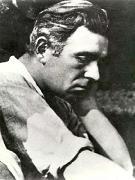 In the autumn, Konstanty refuses to change his prisoner state from military to civil, and induces other prisoners not to do so. As the result, he is sentenced to the penalty section of the Camp Altengrabow.
In the autumn, Konstanty refuses to change his prisoner state from military to civil, and induces other prisoners not to do so. As the result, he is sentenced to the penalty section of the Camp Altengrabow.
From 18th of August till 18th of November, Konstanty systematically makes logs to his Notatnik [Notebook] — his first contact with pen and paper from two years.
1942
On the camp forms, which normally Konstanty uses as paper to write letters to wife, he sends her three poems: List jeńca [A Letter From The Captive], Srebrna akacja [Silver Acaccia] and Dzika róża [A Wild Rose].
1943
In the spring, poet is being transferred to camp's hospital. He works here as a translator and paramedic.
1944
In the hospital, Konstanty meets english doctor, John Burton, who was captured in Italy. As time passes by, friendship rises between them. Burton will appear in number of later poems written by Gałczyński. On the other hand, Burton will devote to Konstanty a large part of his war-time memories [John Burton, Mirador: My Term as Hitler's Guest, London 1986].
In the autumn, after collapse of the Warsaw Uprising, Gałczyński writes Pieśń o fladze [A Song about a Flag].
1945
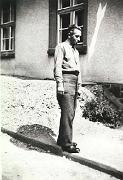 In the beginning of the year, poet is being disciplinary transferred from Altengrabow's hospital to Tangerhütte, later to the munitions factory in Hillersroben, and finally to the iron-foundry in Gardenlegen. After liberation of the camp by British troops, Konstanty finds himself in the transitional camp in Höxter, Westphalia. He writes here a poem Pochodnia [The Torch] as a demontration of his decision to return to Poland.
In the beginning of the year, poet is being disciplinary transferred from Altengrabow's hospital to Tangerhütte, later to the munitions factory in Hillersroben, and finally to the iron-foundry in Gardenlegen. After liberation of the camp by British troops, Konstanty finds himself in the transitional camp in Höxter, Westphalia. He writes here a poem Pochodnia [The Torch] as a demontration of his decision to return to Poland.
Konstanty saves one of the inmates from the transport from women camp in Ravensbrück. Her name is Lucyna Wolanowska. For a short time they live together. In January 1946 their son is born, Konstanty Ildefons Gałczyński. In 1946 Lucyna Wolanowska and little Konstanty went to Australia. Konstanty will visit Poland in June 1990.
From Höxter poet travels to France, Belgium and Holland. Writes a number of lyrical poems: Na dłonie księżniczki Krystyny [On the hands of Princess Kristine], Pokochałem ciebie [I felt in love with You], Gwiazdy [Stars], Ulica Sarg[Sarg Street]. In Paris poet writes most of the Notatki z nieudanych rekolekcji paryskich [Notes from the unsuccessful Paris Recollections], which will be finishing in Poland; he meets Konstanty Jeleński; they became friends. Exchanges letters with publishers in “Orzeł”, Polish magazine from Rome.
In Poland, by the end of the year, a rumor about Konstanty's death appears. “Tygodnik Powszechny” weekly (by Jerzy Turowicz) publishes a memory under a very significant title: Poeta z bożej łaski [Poet by the God's Mercy]. Konstanty contradicts these news, sending a short letter to his wife on a little page from a child's prayer book.
1946
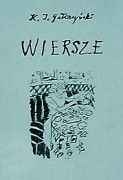 In Italy, in Polish Army headquarters, a book of poetry of Konstanty (with introduction by Jan Bielatowicz) is being published; poems were written from memory of the soldiers, the admirers of his poetry, and that was the reason of so many errors. See one of the pages with Konstanty's corrections in hand. Due to so many errors, He gave up ffter some time.
In Italy, in Polish Army headquarters, a book of poetry of Konstanty (with introduction by Jan Bielatowicz) is being published; poems were written from memory of the soldiers, the admirers of his poetry, and that was the reason of so many errors. See one of the pages with Konstanty's corrections in hand. Due to so many errors, He gave up ffter some time.
On the 22nd of March, on the “Ragne” ship, Gałczyński returns to Poland. He writes some poems during the trip: Cóżem winien [What am I Guilty For?], Pyłem księżycowym [Moon Dust], We śnie [In a Dream], Ucieczka grzesznych [Escape of the Sinners].
After one-week stay in Gdynia, Konstany enters a train going to Cracow [Wikipedia source] and starts the last part of his trip, sending a telegram to wife from every railway station; he finally arrives and Natalia with family awaits him. They move to the later-famous House of the Writers on 22 Krupnicza street.
In April a period of an intense Konstanty's collaboration with “Przekrój” weekly begins. Every week a new episode of the “Green Goose” appears, as well as “Letters with a Violet”, paragraphs and plenty of poems — among them: Powrót do Eurydyki [Return to Euridice], Liryka, liryka, tkliwa dynamika [Lyricism, Lyricsism, Loving Dynamism], Zaczarowana dorożka [The Enchanted Carriage], Kolczyki Izoldy [The Ear-rings of Isolda]. He re-establishes his collaboration with “Szpilki” magazine; publishes in “Tygodnik Powszechny” and in Warsaw's “Odrodzenie”.
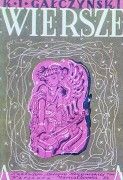 Along with people from “Przekrój” Gałczyński spend summertime in Śledziejowice near Wieliczka. the “Siedem Kotów” [The Seven Cats] cabaret is born here. The first night takes place in November, in a little hall on Zyblikiewicza street in Cracow. Gałczyński himself performs there almost every night, reciting his poems.
Along with people from “Przekrój” Gałczyński spend summertime in Śledziejowice near Wieliczka. the “Siedem Kotów” [The Seven Cats] cabaret is born here. The first night takes place in November, in a little hall on Zyblikiewicza street in Cracow. Gałczyński himself performs there almost every night, reciting his poems.
“Oficyna Księgarska” Publishing House in Warsaw publishes large selection of Konstanty's poems Wiersze [The Poems]. The book is illustrated by Jan Knothe.
1947
Nnumber of works written by Konstanty for “Przekrój”, “Szpilki” and “Odrodzenie” is growing. As after his return to Poland, as well during this year poet works a lot, publishes, as if he wanted to overtake the years of silence. Has numerous author's meetings with his readers: in Cracow, ćląsk, in Gdańsk, in Szczecin. The latter city by the Baltic coast, destroyed by the war, especially comes into his heart. Konstanty — due to constants proposals of Szczecin president, Leonard Borkowicz, about moving there — starts considering seriously that idea.
1948
On May Gałczyńskis finally move to Szczecin [Wikipedia source]. From Szczecin's prosident Konstanty receives a villa on Pogodno, on 17 Curie Skłodowska street.
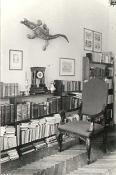 On 3rd of June Konstanty suffers his first heart attack. He's being transported to Warsaw. He gets his apartment here on 6 Aleja Róż. This is his last address.
On 3rd of June Konstanty suffers his first heart attack. He's being transported to Warsaw. He gets his apartment here on 6 Aleja Róż. This is his last address.
After few weeks, when poet feels better, Natalia and Konstanty return do Szczecin, in order to move their things back to Warsaw.
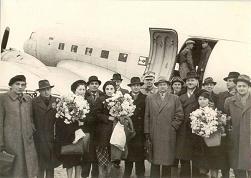 In November Konstanty was the member of the official delegation of Polish authors. They are invited for celebration of the anniversary of Soviet Revolution. Some traces of his joyful encounter with Moscow after 30 years, can be easily found in poems written there.
In November Konstanty was the member of the official delegation of Polish authors. They are invited for celebration of the anniversary of Soviet Revolution. Some traces of his joyful encounter with Moscow after 30 years, can be easily found in poems written there.
The Enchanted Carriage is published by “Czytelnik”. This book contains his post-war poems.
1949
Czechoslovak Ministry of Information invites Gałczyński to come to Prague. He has number of authors' meetings there, meets Czech poets, among the others — František Halas and Jan Pilař, that later became a famous translator of polish poetry. They will remain as friends. Konstanty visits her mother's grave on the Olszany cemetery. Writes number of poems about Prague.
During the spring, Konstanty takes his first trip to Nieborów. Jan Wegner, the custodian, gives to the poet brief introduction to the history of the marble head of Niobe.
Rafał Praga, the chief redactor of the most popular Warsaw newspaper, “Express Wieczorny”, invites Konstanty to cooperation. A series of Warsaw poems is created.
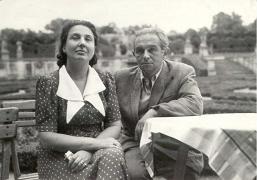 In the summer Gałczyńskis going to Czechoslovakia. Poet undergoes health treatments in Podiebrady.
In the summer Gałczyńskis going to Czechoslovakia. Poet undergoes health treatments in Podiebrady.
“Czytelnik" publishes a selection of poems titled Ślubne obrączki [Wedding Rings].
During the autumn takes another trip to Prague, for the funeral of František Halas.
1950
On the Congress of Writers in June, Adam Ważyk seriously and totally condemns the K. I. Gałczyński's poetry. The “Green Geese” and “Letters with Violet” disappear from “Przekrój”. Publishing of Konstanty's poetry is totally prohibited.
Gałczyński undergoes a period of deep depression. On the top of that he suffers scarlatina. As a cure for his psychic state, he writes a poem on his beloved copmposer, Johann Sebastian Bach.
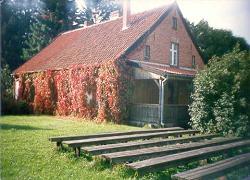 Ziemowit Fedecki, a friend of Konstanty, suggests him to visit beautiful Mazury region, as a perfect place for cure.
Ziemowit Fedecki, a friend of Konstanty, suggests him to visit beautiful Mazury region, as a perfect place for cure.
On the 15th of July Gałczyński head to “Pranie&rdqou; cottage, near Ruciane Nida. Konstanty works on the translation of Midsummer's Dream ordered by his friend and famous Pollish poet, director of one of the Warsaw theatres, Julian Tuwim. Writes poem Kronika olsztyńska [Olsztyn Cronicles], and many other poems. Writes a comedy Grandmother and Grandson, or a Night of Miracles. In the autumn Konstanty starts working on Niobe.
On the international Poetry Night Na during the Congress for the Peace in Warsaw, Konstanty Ildefons Gałczyński recites his poem written in Pranie Przez świat idące wołanie [A Call Across the World] and makes a great success.
“Czytelnik” publishes his little book of poems for children Elektryczne schody [The Escalator].
By the end of December and beginning of January Konstanty and Natalia stay in Pranie, the only winter-time visit there. Among the others, writes a bautiful poem Sanie [The Sleigh].